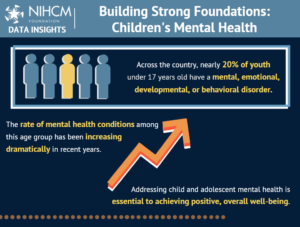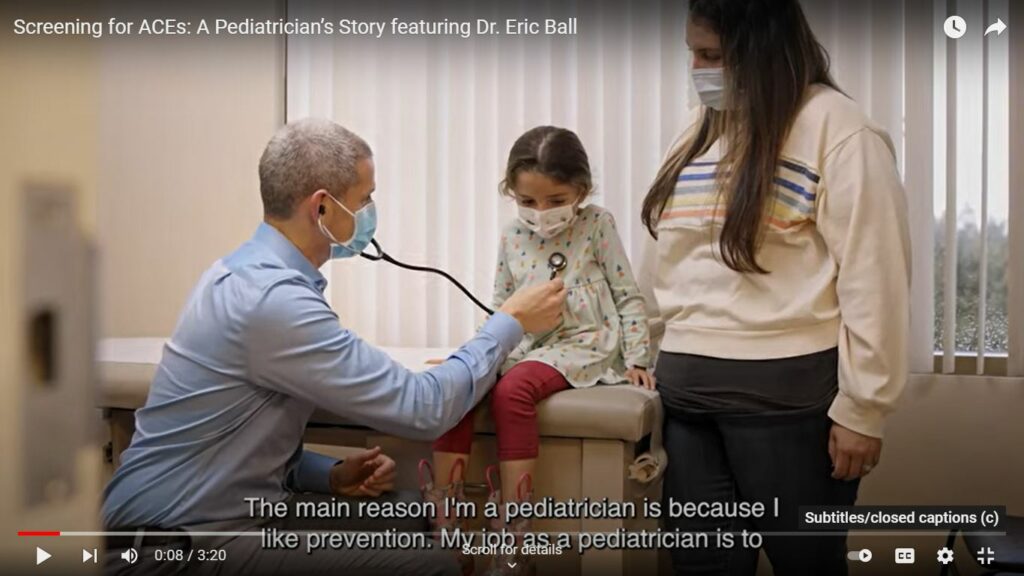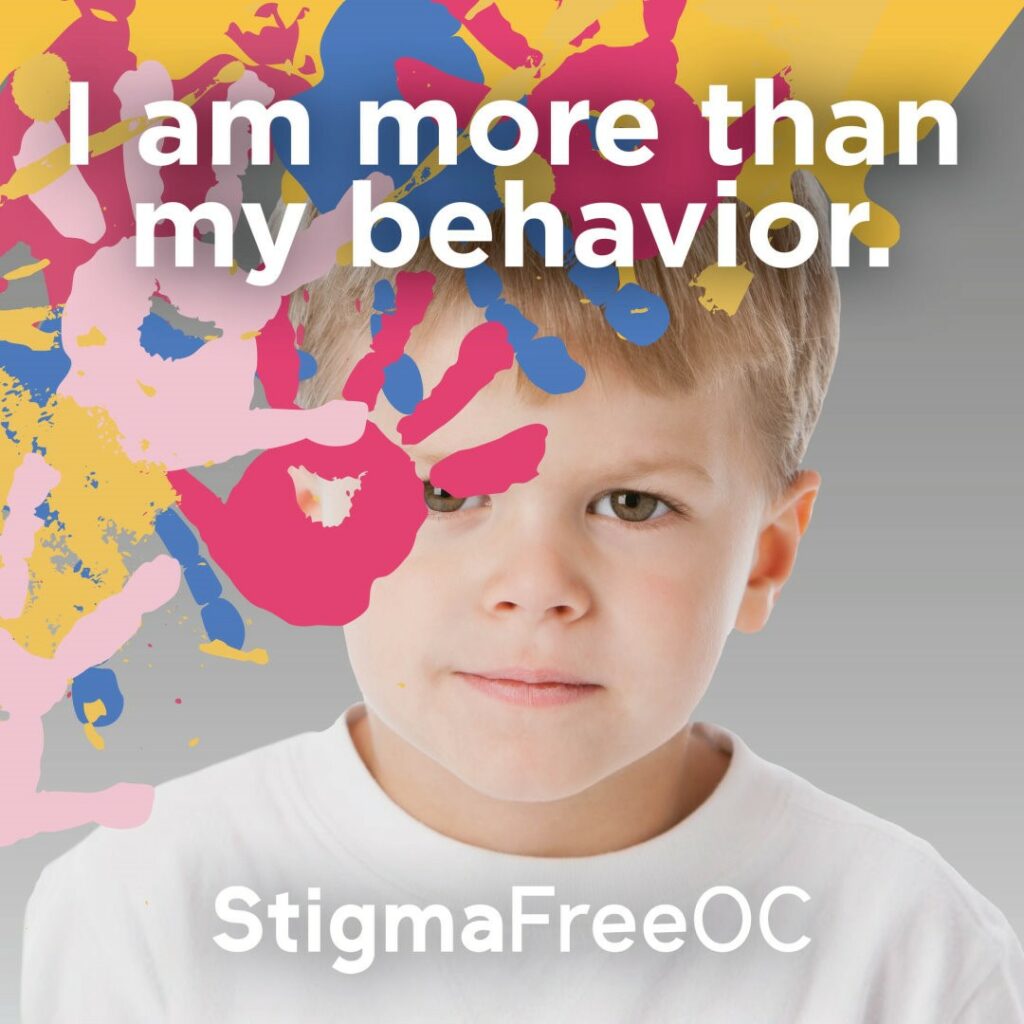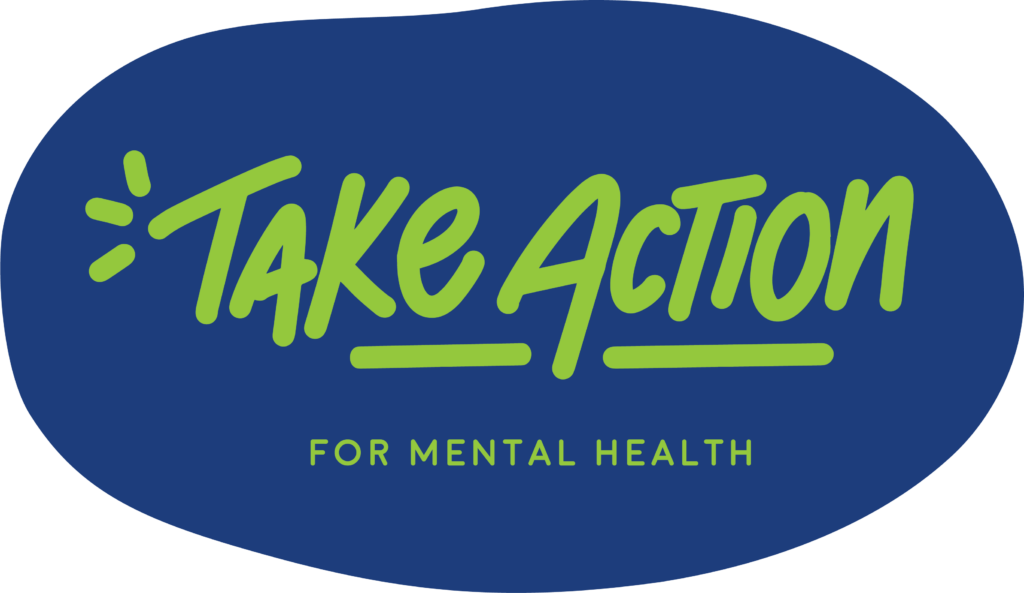Mental Health
Primary Care Physicians Play a Critical Role Through the Early Identification of Risk Factors and Mental Health Concerns
NIHCM: Building Strong Foundations: Children’s Mental Health
NIHCM’s Latest Infographic features Strategies to Address this Critical Health Issue
 Child and adolescent mental health has significantly deteriorated in recent years, resulting in United States Surgeon General Vivek Murthy, MD, issuing two advisories on youth mental health.
Child and adolescent mental health has significantly deteriorated in recent years, resulting in United States Surgeon General Vivek Murthy, MD, issuing two advisories on youth mental health.
Between 2016 and 2020, more than 8 million children and adolescents were diagnosed with anxiety or depression. Despite the high rates of mental health concerns, it is estimated that less than 50% of children and adolescents receive the necessary mental health care.
This infographic examines the state of children’s mental health across the U.S., as well as strategies and solutions to promote adolescent mental health and well-being.
May is Mental Health Awareness Month
Screening for ACEs: A Pediatrician’s Story featuring Dr. Eric Ball

New AAP and AFSP Resource – Blueprint for Youth Suicide Prevention

Stigma Free OC Toolkit

Take Action for Health: Social Media Campaign

Resources for Suicide Prevention
Suicide Data Dashboard
The OC Health Care Agency on Monday unveiled a dashboard with information on suicides among county residents from 2001 to mid-2021 (the most recent data available), including breakdowns by age and gender and call volumes to help lines. Intentional self-harm and suicide continue to be a public health concern in Orange County, California and impacting the well-being of our community members. This dashboard shows suicide and self-harm data in Orange County and can be used for raising community awareness and planning and implementing suicide prevention, intervention and postvention efforts in Orange County.
Read the Full Press Release Here.
After A Suicide: A Toolkit for Schools
A toolkit by the American Foundation for Suicide Prevention/Suicide Prevention Resource Center that consists of recommendations by national experts, school-based personnel, clinicians, researchers, and crisis response professionals on how to address the aftermath of a suicide.
Comprehensive Suicide Prevention Toolkit for Schools
This toolkit addresses suicide prevention and responses to suicidal behaviors in three irrevocably interconnected and interdependent areas: 1. Promotion of mental and physical health and well-being 2. Intervention in a suicidal crisis 3. Postvention response to a suicidal death.
Suicide Prevention Resource Center
The Suicide Prevention Resource Center is the only federally supported resource center devoted to advancing the implementation of the National Strategy for Suicide Prevention. SPRC is funded by the U.S. Department of Health and Human Services’ Substance Abuse and Mental Health Services Administration (SAMHSA).
Know the Signs
Know the Signs is a statewide suicide prevention social marketing campaign built on three key messages: Know the signs. Find the words. Reach out. This campaign is intended to educate Californians how to recognize the warning signs of suicide, how to find the words to have a direct conversation with someone in crisis and where to find professional help and resources.
Preventing Suicide: A Toolkit for High Schools
A toolkit by the U.S. Substance Abuse and Mental Health Services Administration (SAMHSA) that consists of strategies to prevent suicide and promote behavioral health among students.
Web Resources on Self-Injury
The L.A. County Youth Suicide Prevention Project has a whole page of web-based resources on self-injurious behavior including cutting. One web resource cited is Educators and Self-Injury and it provides information on how to recognize, understand, and respond to self-injury. This website has been especially developed for the 80 school districts within Los Angeles County, to provide administrators, staff, parents, and students with the most up-to-date information about the prevention, intervention, and postvention of suicide among our youth.
Teen Suicide, Mood Disorder, and Depression
An article that explains causes and warning signs for suicide, facts and myths associated with suicide, and what you can do to reduce the risk of suicide in teens.
The Role of First Responders in Preventing Suicide
An article by the Suicide Prevention Resource Center (SPRC) and the U.S. Substance Abuse and Mental Health Services Administration (SAMHSA) discussing how to recognize warning signs of suicide, how to help suicide attempters and survivors, and also to how to help yourself and your fellow first responders.
Primary care physicians play a critical role in meeting children’s mental health needs through the early identification of risk factors and emerging mental health concerns.
AAP-OC has played a role in supporting these needs by identifying community resources and referral options for physicians to access. Early identification is promoted through assessment and evaluation of the child in the medical home setting and provides timely intervention to meet the mental health needs of the family. Collaborative relationships with mental health specialists and community resources will promote the delivery of these mental health services for families.
The opportunity to decrease the barriers that exist for physicians and improve communication between the medical community and the mental health resources has been an important objective for the Chapter, and utilization of these resources will support the mental health needs of children and families in our community.
AAP-OC’s Mental Health Committee works collaboratively with community partners to identify resources to enable pediatricians to meet the needs of families with mental health concerns.
Children at Risk (PDF) – By Stephanie Watson

